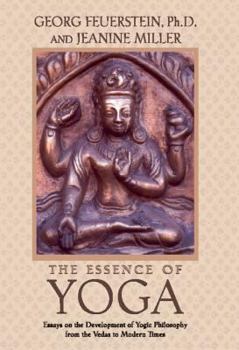The Essence of Yoga: Essays on the Development of Yogic Philosophy from the Vedas to Modern Times
Select Format
Select Condition 
Book Overview
A collection of classic essays by two highly regarded scholars on the development of yoga and its rapport with other religious traditions. Georg Feuerstein, one of the world's foremost scholars of... This description may be from another edition of this product.
Format:Paperback
Language:English
ISBN:0892817380
ISBN13:9780892817382
Release Date:December 1997
Publisher:Inner Traditions International
Length:192 Pages
Weight:0.60 lbs.
Dimensions:0.5" x 5.5" x 8.0"
Customer Reviews
4 ratings
Bedtime reading for philosophers
Published by Thriftbooks.com User , 20 years ago
If you like philosophy and get turned by Yoga, this is a book for you. The chapters are pretty technical and full of yogic terminology, but the presentation is sound and endlessly fascinating. The book has my vote.
Stoppard's words joined to volatile and fascinating history
Published by Thriftbooks.com User , 20 years ago
Tom Stoppard is arguably the single finest playwright of his generation, and the Coast of Utopia trilogy is a massive undertaking that in the hands of a less skilled author could have gone awry and badly. Stoppard though manages to make what could be a painfully pedantic history lesson into a moving portrayal of love, ideology, loss, and change.Voyage is my personal favorite of the three, if only because Liubov Bakunin (sister of the anarchist Michael Bakunin) and Nicholas Stankevich (proponent of German philosophy in Russia) are so stunningly written and so absolutely endearing. The Bakunin sisters as a whole are a lovely treat, funny and charming and feminine but still remarkably intelligent and capable, something often missing from period fiction. Michael Bakunin, Nicholas Stankevich, Vissarion Belinksy, Ivan Turgenev and Alexander Herzen, all major historical figures in their own rights, are amazingly human, but manage to retain the spark of greatness that brought them to their success, even cut short as it was in the cases of Stankevich and Belinsky.The history is neither dominate or secondary to the characterization here, rather Stoppard manages to make the historical events we know (or may not know) part and parcel of the volatile and fascinating lives of some of Russias greatest citizens.
The World According to Bakunin
Published by Thriftbooks.com User , 20 years ago
Stoppard's latest work, the Coast of Utopia trilogy, purports to examine the great minds of Russian philosophy who have been forgotten by the west, the men who built up the age of revolutions.Voyage focuses on the whirlwind that is Michael Bakunin, who will one day become a leading anarchist but who is now just an artillery student who would rather study the new German romantic philosophy with his friends Nicholas Stankevich and Vissarion Belinsky. Stankevich was the founder of the leading philosophical circle in 1830s Moscow, a circle that produced Soviet-beloved literary critic Belinsky and novelist Ivan Turgenev. Revolutionary writer Alexander Herzen makes a breif appearance, but his story is told in the second and third plays.Voyage is the anomaly of the trilogy. It focuses on the Bakunin family, while the other two plays focus on Herzen. It tends to examine broader trends, while the second two are more personal. The rapidly changing world of philosophy, class conflict, the role of women in society are all examined through more than one character. In structure, the second two plays are far more typical. Voyage, in contrast, has a unique organization. The first act flows chronologically, beginning to end, in one locale -- the family estate of Premukhino. But the family does not spend all of their time at Premukhino. The children often travel to Moscow, and the second act takes place there and in St Petersburg, from beginning to end. Thus the second act fills in narrative gaps from the first, and references in the first are fully explained in the second, resulting in some complex but lovely jokes. At the end, a short epilogue returns the scene to Premukhino, a coda as is used in the other two plays at the ends of acts.Stoppard's characters are vibrant, but on the page they lose some of the strength they had on stage. It is perhaps less thrilling to read than to have seen, and many of the jokes are visual. Much of Belinsky's odd charm is from his physical tics, and the scenes between Liubov and Stankevich are only effective when read at the right pace, without making light of the necessary pauses. But in any play, something is lost when not properly performed, and Voyage holds up quite well considering those limitations. I cannot rate it five stars because I was lucky enough to see the first preview of the world premiere, and the written text cannot compare to having seen Douglas Henshall, Raymond Coulthard, Will Keen, and Eve Best create such wonderful roles.Nonetheless, Voyage is eminently readable and highly amusing, and the trilogy is addictive to anyone with an interest in the age of revolutions.
Studies the early roots of yoga
Published by Thriftbooks.com User , 24 years ago
If you are a fan of Georg Feuerstein's writings, this book resembles the Philosophy of Classical Yoga in that it is written for the more intermediate, advanced or scholarly yoga student as it reviews yoga's early roots in the Vedic tradition, while relating the study to the Christian mystic, Meister Eckhart. From her expertise in the Vedas, co-author Jeanine Miller offers her insights that help the Vedas come alive for the reader and realize how the yoga of today springs forth from a 5,000 year old tradition.





